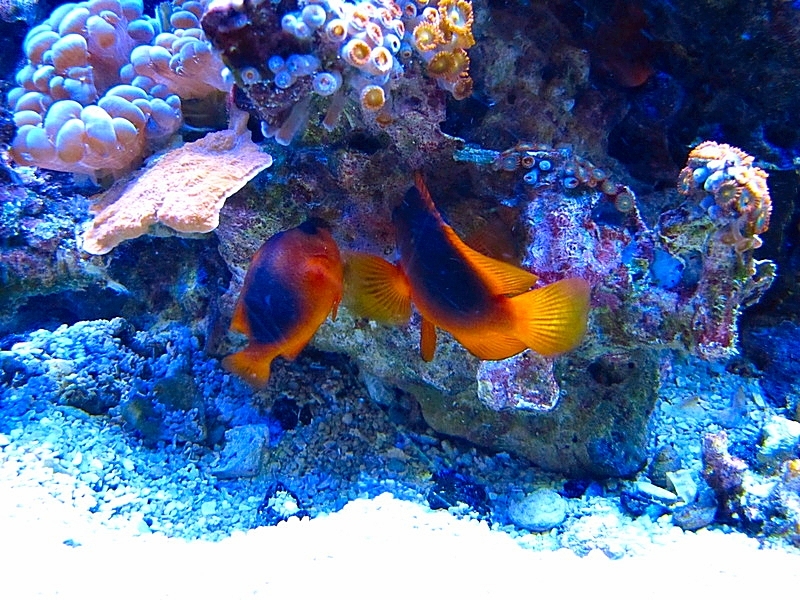detritus is the cause of OTS in aquariums, and without your offsets, your tank would go eutrophic and not be 40. old tank syndrome has some pretty good published works on the web under the subject. we beat it too, solely with detritus control.
you have calculated safe amnts of 40 yr old detritus, not 40 yrs worth.
no doubt, detritus is marine snow, but we now have retail replacement feeds to take the place of that.
This thread here shows the risk of detritus
https://www.reef2reef.com/threads/t...ead-aka-one-against-many.230281/#post-2681445
detritus is a giant liability unless its planned for, and offset, carefully, then its feed reserves.
that duality is how it should be explained imo. its good in some systems, unless you stick your hand in there and slosh things around and then let the cloud flow, then its horrible.
to know the true effects of stored detritus, try to make an old nano reef keep its detritus and stay alive. remove the dilution/speed up the end results
detritus in place isn't all bad, but people rarely stay in one place Paul for as long, and the clean tanks will always beat the dirty ones where any type of action on the system is required.
during a power outage, a detritus stored tank is under MUCH more risk than an organically clean one, BOD readings would be much worse than a bare bottom system with low organic stores. all the extra aerobic bac farmed on detritus substrate are fine as long as the machine stays running...I know you already weathered an outage as well, but these are facts regarding high organic systems and the double sided coin involved. if the generator that runs a tank during a power outage runs out, that's when BOD matters so greatly, fair angle to consider for those who live in prone areas, don't farm detritus as a safety hedge.
if you are going to be relocating anytime within the life of your tank, then low detritus can be a big safety hedge.
I cannot locate the benefit detritus actually gives to a system, we have feed systems to replace it so that nutrients arent located packed into a sandbed.
if worms and pods are the goal, then a simple remote sandbed would provide that, and be pre filtered of the massive fish waste a display sees. in my nano reefs I don't care about worms and pods as much as I care about coralline covered rock and coral export, detritus lends no benefit to those two goals so I keep it out just my way.
you have calculated safe amnts of 40 yr old detritus, not 40 yrs worth.
no doubt, detritus is marine snow, but we now have retail replacement feeds to take the place of that.
This thread here shows the risk of detritus
https://www.reef2reef.com/threads/t...ead-aka-one-against-many.230281/#post-2681445
detritus is a giant liability unless its planned for, and offset, carefully, then its feed reserves.
that duality is how it should be explained imo. its good in some systems, unless you stick your hand in there and slosh things around and then let the cloud flow, then its horrible.
to know the true effects of stored detritus, try to make an old nano reef keep its detritus and stay alive. remove the dilution/speed up the end results
detritus in place isn't all bad, but people rarely stay in one place Paul for as long, and the clean tanks will always beat the dirty ones where any type of action on the system is required.
during a power outage, a detritus stored tank is under MUCH more risk than an organically clean one, BOD readings would be much worse than a bare bottom system with low organic stores. all the extra aerobic bac farmed on detritus substrate are fine as long as the machine stays running...I know you already weathered an outage as well, but these are facts regarding high organic systems and the double sided coin involved. if the generator that runs a tank during a power outage runs out, that's when BOD matters so greatly, fair angle to consider for those who live in prone areas, don't farm detritus as a safety hedge.
if you are going to be relocating anytime within the life of your tank, then low detritus can be a big safety hedge.
I cannot locate the benefit detritus actually gives to a system, we have feed systems to replace it so that nutrients arent located packed into a sandbed.
if worms and pods are the goal, then a simple remote sandbed would provide that, and be pre filtered of the massive fish waste a display sees. in my nano reefs I don't care about worms and pods as much as I care about coralline covered rock and coral export, detritus lends no benefit to those two goals so I keep it out just my way.
Last edited:



















